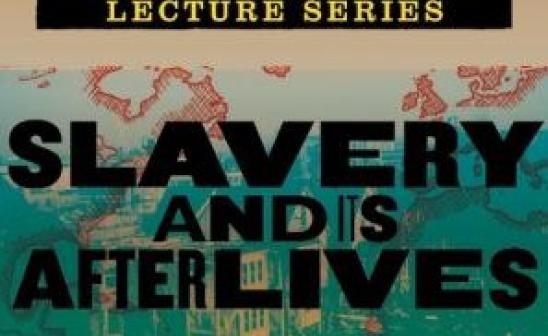Department of History honors legacy of John Hope Franklin with lecture series

SLAVERY AND ITS AFTERLIVES
UChicago’s groundbreaking lecture series highlights the legacy of John Hope Franklin
By Sarah Fister Gale
In October 2019, the Department of History hosted the first of a new lecture series reflecting the role the University of Chicago has played in shaping the field of African American Studies. The series was co-sponsored by the Division of the Social Sciences and the Center for the Study of Race, Politics, and Culture.
Slavery and Its Afterlives: the John Hope Franklin Lectures, held October 2-4, honored the legacy of its namesake, John Hope Franklin, a distinguished historian and former UChicago professor whose work transformed our understanding of the African-American past. Franklin joined UChicago’s Department of History in 1964, and he retired in 1982 as the John Matthews Manly Distinguished Service Professor.
Franklin is considered one of our nation’s leading historians. He was the first African American to serve as president of both the American Historical Association (AHA) and the Organization of American Historians (OAH), and was author the groundbreaking book From Slavery to Freedom: A History of Negro Americans, which became the longest continuously published survey text used in American history courses.
This lecture series will shine a light on Franklin’s work and the work of other scholars on the history of slavery and its legacies, the African diaspora, and topics related to race, slavery, and freedom throughout the world. “We are seeing a revitalization of this field of research at UChicago, exploring the history of slavery, emancipation and its afterlives,” says Jon Levy, professor in the Department of History and the John U. Nef Committee on Social Thought, who is among those organizing the event. “In many respects the University of Chicago has always been at the forefront of this field of study.”
The three day series, which is open to everyone, will include lectures and panel discussion with several prominent scholars:
"Madwomen on the Slave Ship, Reproduction and Racial Capitalism" (October 2). Jennifer Morgan, professor of history and chair of the department of social and cultural analysis at New York University (NYU) gave a lecture based on her current research on the intersections of gender and race in in the Black Atlantic world.
Morgan recently authored the article “Accounting for ‘The Most Excruciating Torment’: Trans-Atlantic Passages” in History of the Present; and the essay, “Experiencing Black Feminism” for Deborah Gray White’s edited volume Telling Histories: Black Women Historians in the Ivory Tower (2007).
"Tacky’s Revolt: The Story of an Atlantic Slave War” (October 3). Vincent Brown, the Charles Warren Professor of History and Professor of African and African American Studies at Harvard, presented a lecture on his latest book, an account of the largest slave revolt in the eighteenth-century British Atlantic world, which reshaped ideas of race and popular belonging.
Brown is a multi-media historian who directs the History Design Studio and teaches courses in Atlantic history, African diaspora studies, and the history of slavery. He is also the author of The Reaper's Garden: Death and Power in the World of Atlantic Slavery (Harvard University Press, 2008) and producer of an audiovisual documentary about the anthropologist Melville J. Herskovits, which was broadcast on the PBS series Independent Lens.
"Slavery and its Afterlives” (October 4): This roundtable discussion was moderated by Destin Jenkins, UChicago’s Neubauer family assistant professor of history. The panelists included Brown, Morgan, and four UChicago scholars:
- Adam Green, associate professor of American history and the College, whose research focuses on African American history, urban history, and comparative racial politics.
- Julie Saville, associate professor emerita of history and the College. Her research focuses on plantation societies, and how broad historical changes during the era of transatlantic slave emancipations are related to daily life, the social relations of labor, and popular forms of political expression.
- Brodwyn Fischer, professor of Latin American History and the College who’s research focuses on cities, citizenship, law, migration, race, and social inequality;
- Sarah Jessica Johnson, provost's postdoctoral fellow in English, who is studying seventeenth through nineteenth-century archives of slavery and marronage in the United States and Caribbean.
Along with exploring past events, Levy expects all of the speakers to draw connections to current events, bringing insights into what is occurring in politics and culture today. Each event will include a Q&A with the speakers.
Levy anticipates the series will become an annual event, bringing together scholars from throughout the world. “This field of study was built through a lot of hard fought struggles by people like John Hope Franklin,” Levy says. “The research is important and we are proud to be investing in it.”
